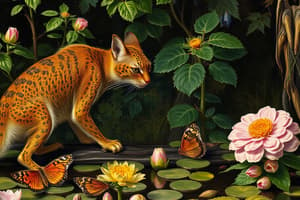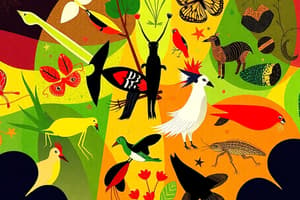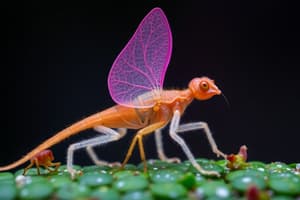Podcast
Questions and Answers
What is the primary cause of species extinction, as stated in the text?
What is the primary cause of species extinction, as stated in the text?
The primary cause of species extinction is the last members of the species dying, often due to human actions.
Why is studying biodiversity crucial, according to the text?
Why is studying biodiversity crucial, according to the text?
Studying biodiversity helps us understand the extent of extinction and consider ways to prevent it.
Define biodiversity in brief.
Define biodiversity in brief.
A term that refers to the number of different species in a given area.
Why might humans need to understand and preserve biodiversity, according to the text?
Why might humans need to understand and preserve biodiversity, according to the text?
What is the approximate number of species known to science, as indicated in the provided image?
What is the approximate number of species known to science, as indicated in the provided image?
How are new species officially classified as 'known'?
How are new species officially classified as 'known'?
Name and briefly describe the three levels at which biodiversity can be studied.
Name and briefly describe the three levels at which biodiversity can be studied.
Explain the relationship between healthy ecosystems and a healthy biosphere.
Explain the relationship between healthy ecosystems and a healthy biosphere.
Define the term 'keystone species' and provide an example from the text.
Define the term 'keystone species' and provide an example from the text.
How did the recovery of sea otter populations affect kelp beds along the Pacific coast?
How did the recovery of sea otter populations affect kelp beds along the Pacific coast?
What is the significance of genetic diversity within populations for species survival?
What is the significance of genetic diversity within populations for species survival?
Explain how a 'bottleneck' can affect a population's genetic diversity.
Explain how a 'bottleneck' can affect a population's genetic diversity.
Why is genetic variation important when a disease strikes a population?
Why is genetic variation important when a disease strikes a population?
What benefit did chimps derive from chewing on the pith of Vernonia amygdalina?
What benefit did chimps derive from chewing on the pith of Vernonia amygdalina?
What percentage of drugs prescribed in the United States are derived from plants?
What percentage of drugs prescribed in the United States are derived from plants?
What can undiscovered and poorly studied species potentially offer to humans?
What can undiscovered and poorly studied species potentially offer to humans?
Why is depending on only a few varieties of crops for food considered risky?
Why is depending on only a few varieties of crops for food considered risky?
How have wild plant relatives been used to help save crops?
How have wild plant relatives been used to help save crops?
Why do some people believe we should preserve biodiversity, even if species have no direct value to humans?
Why do some people believe we should preserve biodiversity, even if species have no direct value to humans?
How do some regions benefit economically from biodiversity?
How do some regions benefit economically from biodiversity?
Flashcards
What is Biodiversity?
What is Biodiversity?
The variety of life in an area, usually referring to the number of different species.
What is Species diversity?
What is Species diversity?
Variety of species in an area. Measure of the number of different species in an area.
What is Ecosystem diversity?
What is Ecosystem diversity?
The variety of habitats, communities, and ecological processes within and between ecosystems.
What is Genetic diversity?
What is Genetic diversity?
Signup and view all the flashcards
Why is genetic diversity important?
Why is genetic diversity important?
Signup and view all the flashcards
What is a keystone species?
What is a keystone species?
Signup and view all the flashcards
Crops and Biodiversity
Crops and Biodiversity
Signup and view all the flashcards
What is Ecotourism?
What is Ecotourism?
Signup and view all the flashcards
What is the bottleneck effect?
What is the bottleneck effect?
Signup and view all the flashcards
Study Notes
What is Biodiversity?
- Unique species of organisms are constantly becoming extinct
- Scientists lack certainty on the exact number of species facing extinction
- Studying biodiversity aids in understanding extinction rates and potential prevention
A World Rich in Biodiversity
- Biodiversity is short for biological diversity
- It refers to the number of species in a specific location
- Tropical rain forests contain significant species diversity
- Understanding and preserving biodiversity is crucial due to complex interspecies relationships
Unknown Diversity
- The scientific task of cataloging all species on Earth remains incomplete
- Approximately 1.7 million species are scientifically known, with insects comprising the majority
- The actual number of species on Earth is unknown
- Conservative estimates suggest over 10 million distinct species exist
- A new species is "known" once it is properly classified and described
Levels of Diversity
- Species diversity refers to the variety of species in a given area
- Ecosystem diversity refers to the range of habitats, communities, and ecological processes
- Genetic diversity refers to the variety of genes within a population
Species are Connected to Ecosystems
-
Healthy ecosystems are vital for a healthy biosphere
-
Every species plays a role in the ecosystem, although some roles are subtle
-
Every species is influenced by at least one other species
-
The disappearance of one species has consequences for the wider ecosystem
-
Keystone species are vital to an ecosystem's function
-
The sea otter is a keystone species as evidenced by the loss of kelp beds along the Pacific Coast when the sea otter population was decimated
-
Kelp forests were restored after the recovery of the sea otter population
Species and Population Survival
- Genetic diversity enables species survival
- Higher genetic diversity correlates to chances of surviving environmental changes
- Populations with low genetic diversity are less resilient to change
- Reduced genetic diversity results when a population contracts, even with subsequent population increases
- Reduced genetic diversity makes a population more vulnerable
Populations Need Diversity
- Genetic diversity makes populations more resilient
- Genetic variation can allow certain individuals to survive diseases
- Decreased disease spread is due to resistance among some individuals
- Cloned animals are vulnerable to diseases that can wipe out the entire group
Chimp Medicines
-
Wild plant usage is not limited to humans
-
25% of prescription drugs in the US are plant derived
-
Most traditional medicines come from plant-based chemicals
-
Some plants and their medicinal properties are shown in the common medicines derived from plants
-
Species are an untapped source of potential products
-
Newly discovered species can lead to new materials and chemicals
-
Humans derive many benefits from biodiversity
-
Most crops worldwide originated in a few highly biodiverse regions
-
Modern crops often result from combining genetic material from multiple populations
-
Relying on single crops poses risks
-
Famines are linked to disease-related crop losses
-
Wild relatives can be crossbred with crops to save crops from diseases
Ethics, Aesthetics, and Recreation
- Biodiversity should be preserved for ethical reasons
- Species and ecosystems have inherent value
- Earth's organisms are seen as gifts in certain cultures and religions
- Aesthetic and personal enjoyment of biodiversity is valued
- Ecotourism generates income and supports conservation in ecologically unique areas
Studying That Suits You
Use AI to generate personalized quizzes and flashcards to suit your learning preferences.



